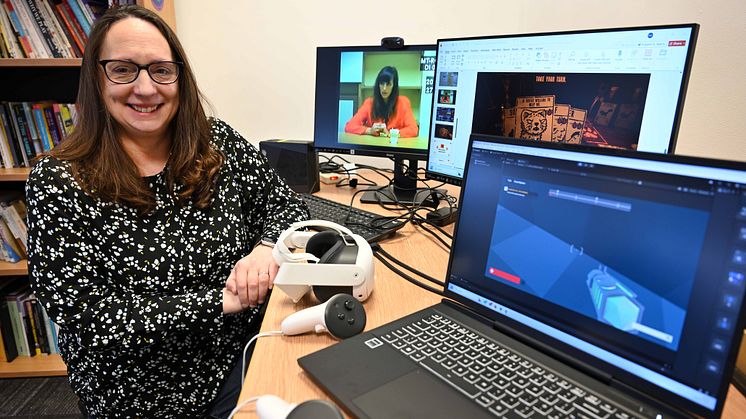
Press release -
New research could enhance the future of teaching in higher education
Academics from universities across the UK are about to launch a research project which could lead to changes in how higher education is taught – with a move away from traditional lectures in favour of a more interactive and playful approach to learning.
In an ever-changing world, employers are looking for more than just academic knowledge from university graduates, with problem-solving abilities, resilience, creativity, and teamwork skills all now highly valued.
Many higher education degree programmes still use traditional methods of teaching and assessment, such as lectures and examinations. Now, a new research project involving academics from across the UK will examine how universities can improve the way experiential and interactive skills are taught – enhancing student learning and providing graduates with the skills needed to tackle the complex challenges faced by future societies.
The group of academics, led by Professor Nic Whitton of Northumbria University, are about to carry out a three-year study which aims to evidence the value of different approaches to learning.
The £1 million RE:PLAY project (Researching the Effectiveness of Playful Learning in Higher Education) has been granted almost £800,000 of funding from the Economic and Social Research Council (ESRC), with the remainder funded by the collaborating institutions.
It is the first large-scale, systematic study into the effectiveness of the playful learning approach – which encourages students to play an active role in their learning, through processes such as role play, interactive simulations, games, digital toys, quests and challenges. It will develop a deep understanding of the types of playful learning that are effective in different contexts, and why.
The project aims to change attitudes towards play in universities by encouraging leaders to be more confident in endorsing play, developing academics’ skills and confidence to use playful learning approaches, and supporting students to learn from play.
Professor Whitton said: “The pandemic has forced universities to rethink how they teach, yet resistance to change remains strong due to sector-wide challenges such as funding constraints and increasing workloads.
“Playful learning is not about making education frivolous; it’s about creating environments where students feel safe to experiment, fail, and learn from their mistakes.
“By demonstrating what works and why, we can challenge outdated teaching norms and better prepare graduates for the challenges of tomorrow.”
The RE:PLAY project will be conducted in four phases. The first will explore how playful learning approaches are currently used and how they are perceived by senior leaders. The second will investigate experiences, benefits, drawbacks, and barriers associated with playful learning. The third will develop a research-backed framework and toolkit for designing effective playful learning experiences. And the fourth will research the effects of playful learning on students, including their learning, motivation, fear of failure, sense of belonging, and creativity.
The ESRC-funded research will be carried out by a collaboration of academics at Northumbria University, Durham University, Anglia Ruskin University, University of Sussex, Coventry University, and University of the Arts London.
In addition, six partner institutions – University of the Highlands and Islands, University of Edinburgh, University of Exeter, University of Greater Manchester, City St George’s University of London, and Teesside University – will support the research by carrying out surveys with their staff and students.
One aspect of playful learning embraced by Northumbria University is experiential learning – often described as ‘learning by doing’.
This style of learning forms a cornerstone of Northumbria’s strategy to power an inclusive economy – resulting in more graduates from Northumbria gaining highly skilled jobs in the North East than any other university – and is now offered to every undergraduate student no matter which course they study.
Professor Graham Wynn is Pro Vice-Chancellor for Education at Northumbria University. He said: “Experiential and playful learning are at the heart of producing graduates who can thrive in uncertainty.
"This research into playful learning approaches is vital as we prepare graduates for complex future challenges where creativity and adaptability are as important as subject knowledge.
"We're proud to support work that can open up new teaching approaches that don’t just convey knowledge, but build confidence, curiosity and resilience.”
Professor Nic Whitton is a Professor of Digital Learning and Play and a founding member of the Playful Learning Association– a group of educators, researchers, and university leaders who work together to promote playful learning in higher education.
Visit the Northumbria University Research Portal to find out more about Professor Whitton’s work.
Topics
Categories
UNIVERSITY OF THE YEAR 2022 (Times Higher Education Awards)
Northumbria is a research-intensive university that unlocks potential for all, changing lives regionally, nationally and internationally.
Two thirds of Northumbria's undergraduate students come from the North East region and go into employment in the region when they graduate, demonstrating Northumbria's significant contribution to social mobility and levelling up in the North East of England.
Find out more about us at www.northumbria.ac.uk
--- Please contact media.communications@northumbria.ac.uk with any media enquiries or interview requests ---







